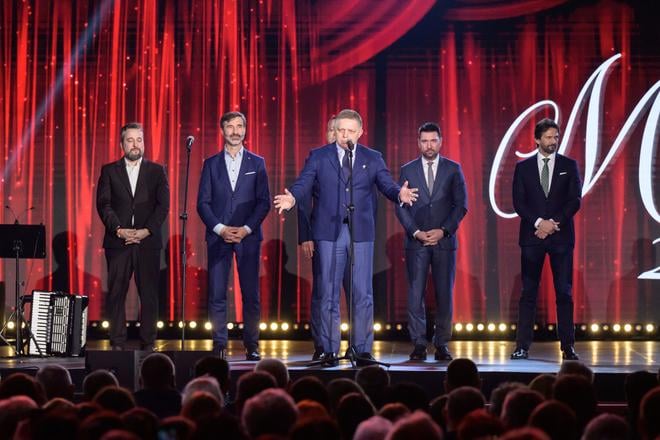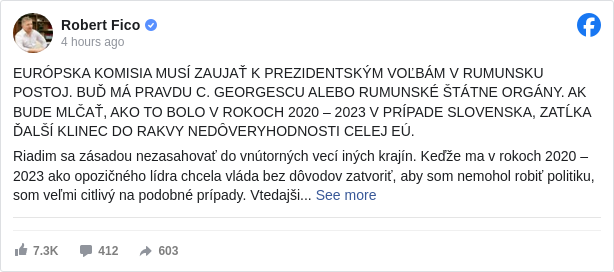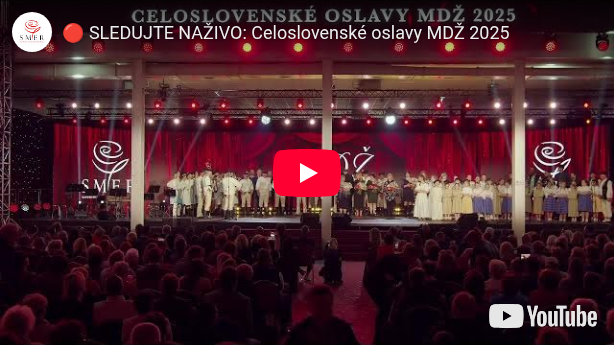Prime Minister Robert Fico has called on the European Commission to intervene in Romania’s electoral crisis, warning that its inaction could damage the credibility of the European Union.
Fico’s remarks came after Romanian authorities refused to reinstate Călin Georgescu as a candidate in the re-run of the country’s annulled presidential election. Georgescu, a controversial nationalist figure with ties to far-right circles, unexpectedly won the first round of voting in November, despite polling in the low single digits before the vote. Romania’s Constitutional Court later nullified the results, citing evidence that Russian disinformation campaigns – primarily via TikTok and Telegram – had distorted the electoral process.
“The European Commission must take a position on the Romanian elections and take responsibility for it,” Fico declared on social media. “If Călin Georgescu is being wronged simply because he holds different views, he must be granted European protection. But if the Commission believes that Romanian authorities acted correctly, it must stand behind them.”
The decision to bar Georgescu from the ballot was upheld by Romania’s top court, while prosecutors launched an investigation into the former candidate for inciting actions against the constitutional order, endorsing fascist and xenophobic ideologies, and failing to disclose campaign funding sources. A fresh first-round vote is scheduled for May 4, with a potential runoff on May 18.
Fico’s intervention aligns him with critics of the EU within U.S. Republican circles. Billionaire Elon Musk, a close ally of President Donald Trump, called the disqualification of Georgescu “insane” on his social media platform X, amplifying claims that democracy was “officially dead” in Romania and the EU. Several figures from Trump’s orbit have argued that the case illustrates how European governments suppress political dissent.
The Slovak prime minister met with Musk during his trip to the USA in late February, sharing a photo on social media.
For Fico, however, the Romanian election is not just about defending an embattled candidate. The prime minister has a long history of attacking Brussels, particularly over what he sees as the selective enforcement of democratic norms. After finding himself in opposition following the 2020 elections – and even after returning to power in late 2023 – he has railed against the EU, accusing it of ignoring what he claims were politically motivated prosecutions against his party, Smer, during its time in opposition from 2020 to 2023.
His calls for intervention in Romania fit into a broader narrative of portraying the EU as hypocritical and selectively punitive.
“I'm speaking openly about this case because it is a carbon copy of what happened in Slovakia between 2020 and 2023. As an opposition leader, I was charged four times for political activity (…), surveilled at a hunting lodge under the pretext of poaching, and avoided detention only because parliament narrowly voted to protect me. The ruling machinery at the time – and today’s opposition – did not hesitate for a second and was ready to imprison me without cause to prevent me from leading Smer into the parliamentary elections and forming a government for the fourth time. The European Commission remained silent because it suited them,” Fico said in February.
At home, Fico’s rhetoric also serves another purpose: distracting from Slovakia’s own pressing issues. With public finances under strain, rising prices, and the healthcare system in crisis, the Slovak leader has increasingly turned to cultural issues. Over the weekend, at a Smer event in Nitra marking International Women’s Day, he reaffirmed his push to enshrine traditional gender roles - man and woman - in the constitution.
“We need to build a dam against liberalism and progressivism,” he told a mostly older female audience in the 4,000-seat hall, many of whom had been bussed to Nitra from across Slovakia on Smer-funded transport, before backtracking on his use of foreign terms, rephrasing in Slovak: “We must build a dam against unnatural things.” He went on to claim that politics is now divided between those with “common sense and normal views” and those without.
Fico’s efforts to amend the constitution also include a push to ensure that European legislation is not superior to Slovak law if it conflicts with the Slovak constitution. The supremacy of EU law applies only in areas where the European Union has specific competencies.
As is often the case at Smer gatherings marking International Women’s Day, the event featured its share of folksy wisdom and gendered quips from the prime minister and his party colleagues. “A woman is the golden pillar of the home,” Fico said. “A house without a woman is like a mill without water,” the prime minister continued. He then added wisdom that his grandfather shared with him: “We shouldn’t trust a sleeping dog, a gypsy who makes promises, or a crying woman. That’s why we must be very careful when talking about women and trying to shape a certain image of them.”
The party’s finance minister, Ladislav Kamenický, took a more policy-driven approach, promising to enshrine equal pay for men and women in the constitution – though gender inequality was only discussed briefly and an hour into the event.
At the event, women were treated to free music, hearty goulash, and a dose of political theatre. They were also handed flowers.
As the Slovak daily Denník N pointed out, in Smer’s 42-member parliamentary caucus, only four MPs are women. Additionally, Fico recently appointed Rudolf Huliak - a known sexist - as his sports and tourism minister. The former mayor of Očová once declared that a woman should never hold the position, stating: “I don’t think Očová is quite ready for, how should I put it, this kind of gender equality,” Huliak said. Moreover, Fico’s coalition maintains close ties with extremist Daniel Bombic, who has a history of publicly shaming women.
Also present at the event was pro-Russian MEP and Smer stalwart Ľuboš Blaha, who took the opportunity to praise Slovak women – while lambasting those in Brussels for supposedly pushing “76 genders”. Blaha, who visited Moscow last week and met with the head of Russia’s secret service, used the trip to call for European Commission President Ursula von der Leyen to be tried in a “new Nuremberg tribunal” for the EU’s support of Ukraine in Russia’s war against Slovakia’s eastern neighbour.




